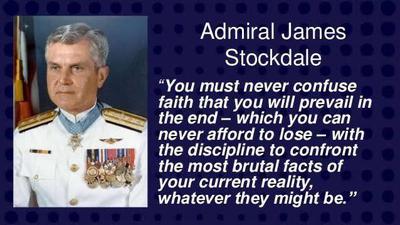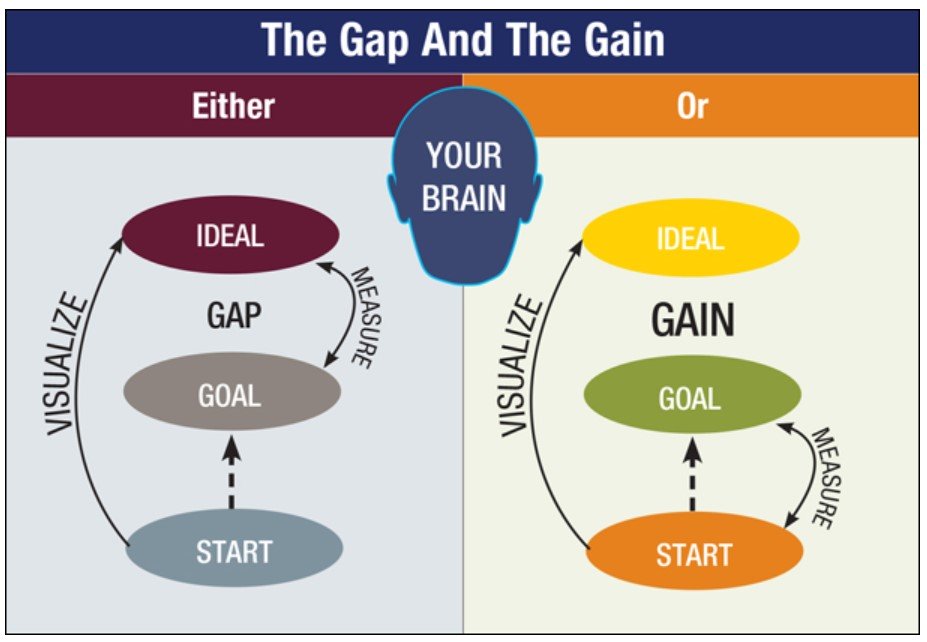The Gap And The Gain
How Your Brain Sabotages Your Happiness
I Still Haven't Found What I am Looking For
"The Gap and The Gain" is the big idea of a book by executive coach Dan Sullivan and psychologist Dan Hardy about how we measure our progress in the pursuit of big goals and the effect that has on our happiness and overall well being.
Dan Sullivan's focus is on high achieving business people which is not surprising given that he is a very successful executive coach charging very high fees for his services.
I am writing about this is because the basic idea of the gap and the gain has a far wider application than executive coaching and touches on something that affects many, if not most, of us.
Goal oriented people - which is most of us - have an ideal that they are moving towards. This ideal is a moving target that is always out of reach and their measurement of progress always shows that they have fallen short. Their mindset is one of "stuck in seeking". This is the gap.
In contrast, happy contented people measure their progress against their former selves and where they have come from. This is the gain.
You can see this illustrated in the schematic above.
The Gap
- A forward measurement. It measures the distance between where we are now and where we think we want to be - which is always and ideal goal and by its very nature is always a moving target that remains out of reach.
- An external measurement. It measures against something that is external to us and to which we have an attachment.
- A mindset of avoiding now to get to there.
- A mentality of lack, scarcity and "not having".
The Gain
- A backwards measurement. It measures your progress to date about where you have from.
- An internal measurement. It is a self-referential measurement. You don't measure against your ideals nor do you compare yourself to anything that is external to you. You define your progress.
- Something that you know you don't need. You don't have an unhealthy attachment to the pursuit of your goals.
- A mindset of self determination. You define what success means to you.
Courtesy of Dan Sullivan and "The Strategic Coach" you can download this free illustrated ebook presentation of The Gap And The Gain.
How Your Lizard Brain Sabotages Your Happiness
The fundamental problem is that we are hardwired to the gap as our default setting.
Why? Because this is the function and purpose of our amygdala aka "The Lizard Brain" which is responsible for our instinctive drives.
As Seth Godwin pithily put it:
"The lizard brain is hungry, scared, angry and horny"!
The lizard brain doesn't think reflectively it reacts automatically to what it sees in front of it. The result of these primal drives is that:
- Our default setting is: "What can go wrong?" Our conscious mind and our ego get involved and "thinking mind" starts a thought stream of anxiety, insecurity and loss of control.
- Our problem-solving drive kicks in. We feel compelled to do something.
- We then feel compelled to measure our progress. We default to the ideal we see in front of us.
- We are hardwired for immediate gratification. This stresses us because we live in a deferred gratification environment.
All of this gets further compounded as our egos get involved and we self identify with our measurements.
Before long we are in downward spiral of anxiety and suffering and we become controlled by our thoughts on the ferris wheel of suffering.
Redefining The Gap And The Gain
Resolving How Your Brain Sabotages Your Happiness

A Model For Maintaining An Ideal And Measuring Progress
What has become known "The Stockdale Paradox" offers us a model for maintaining an ideal and measuring progress.
It's named after the late James Stockdale, former vice presidential candidate, naval commander and prisoner of war during the American-Vietnam war. It is the strategy that enabled Stockdale to survive 8 years of imprisonment and torture.
The usual context of these principles is in times of prolonged and seemingly never-ending hardship, set-backs, suffering and distress.
But in my view this is an apt model for the gap and gain concept:
What Progress To Measure And When?
We have already established that:
- The forward and external measurement of progress - the gap mindset - doesn't help because it leads to self sabotage of happiness and peace of mind.
- The backwards and internal measurement of progress - the gain mindset - is self referential and self determined.
There is a further measure of progress that deals with the lizard brain and that give the ego something useful to do and shuts it up, and that is:
[1] Focus on The Process Not The Ideal
Shift your focus from the long-term ideal to a daily routine that will realise that ideal.
As James Clear puts in The Evolution of Anxiety:
- "Instead of worrying about living longer, focus on taking a walk each day.
- Instead of worrying about whether your child will get a college scholarship, focus on how much time they spend studying today.
- Instead of worrying about losing enough weight for the wedding, focus on cooking a healthy dinner tonight.
The key insight that makes this strategy work is making sure your daily routine both rewards you right away - immediate return - and resolves your future problems - delayed return."
[2] Measure The Small Steps In The Process
Without measurement you have no feedback.
James Clear:"The first thing you can do is measure something:
- You can’t know for certain how much money you will have in retirement, but you can remove some uncertainty from the situation by measuring how much you save each month.
- You can’t be sure that you’ll get a job after graduation, but you can track how often you reach out to companies about internships.
- You can’t predict when you find love, but you can pay attention to how many times you introduce yourself to someone new.
The act of measurement takes an unknown quantity and makes it known.
- When you measure something, you immediately become more certain about the situation.
- Measurement won’t magically solve your problems, but it will clarify the situation, pull you out of the black box of worry and uncertainty, and help you get a grip on what is actually happening."
Recommended Reading:
The Stockdale Paradox - How To Deal With The Attrition Factor
Delayed Gratification - Your Brain Is Not Evolved To Wait
How To Benefit From The Unseen Margins - 5 Key Tips For Success
The Long Game - Delay Gains Now To Get More Later
The Challenges Of The Road Less Traveled - When Playing The Long Game
Return from "The Gap And The Gain" to : Mental Models
LATEST ARTICLES
Does Prayer Work? The Psychology of Prayer, Meditation and Outcomes
 Reality Is A Complex System Of Countless Interactions - Including Yours. So does prayer work? The problem is that the question itself is usually framed in a way that guarantees confusion. We tend to a…
Reality Is A Complex System Of Countless Interactions - Including Yours. So does prayer work? The problem is that the question itself is usually framed in a way that guarantees confusion. We tend to a…Living in Survival Mode Without Surrendering Mental Authority
Living in Survival Mode Without Surrendering Mental Authority
 Clear Thinking When You’re Just Trying to Stay Afloat. Many people today are overwhelmed because they are living in survival mode - not temporarily, but as a persistent condition of life. For many, th…
Clear Thinking When You’re Just Trying to Stay Afloat. Many people today are overwhelmed because they are living in survival mode - not temporarily, but as a persistent condition of life. For many, th…Manifestation Without Magic: A Practical Model
 Manifestation without magic is not a softer or more intellectual version of popular manifestation culture. It is a different model altogether. Popular manifestation teachings tend to frame reality as…
Manifestation without magic is not a softer or more intellectual version of popular manifestation culture. It is a different model altogether. Popular manifestation teachings tend to frame reality as…Staying Committed When You Can't See Progress - The Psychology of Grit
 Uncertainty Is Not The Absence Of Progress, Only The Absence Of Reassurance. One of the most destabilising experiences in modern life is not failure, but uncertainty and staying committed when you can…
Uncertainty Is Not The Absence Of Progress, Only The Absence Of Reassurance. One of the most destabilising experiences in modern life is not failure, but uncertainty and staying committed when you can…The Battle For Your Mind - How To Win Inner Freedom In A Digital Age Of Distraction
 From External Events to Inner Events. We often think of “events” as things that happen out there: the traffic jam, the rude comment, the delayed email reply. But what truly shapes our experience is wh…
From External Events to Inner Events. We often think of “events” as things that happen out there: the traffic jam, the rude comment, the delayed email reply. But what truly shapes our experience is wh…How to See Your Thoughts Without Becoming the Story
 A Practical Guide to Thought-Awareness. You can spend your life inside the stories of your mind without ever learning how to see your thoughts clearly and objectively. Most of the stuff we tell oursel…
A Practical Guide to Thought-Awareness. You can spend your life inside the stories of your mind without ever learning how to see your thoughts clearly and objectively. Most of the stuff we tell oursel…The Collison Decision Matrix - A Simple Framework for Better Choices
 The Collison Decision Matrix Is A Practical Everyday Thinking Tool. Most of us spend a surprising amount of time worrying about decisions. From small ones such as what to wear, what to eat, what to te…
The Collison Decision Matrix Is A Practical Everyday Thinking Tool. Most of us spend a surprising amount of time worrying about decisions. From small ones such as what to wear, what to eat, what to te…The Power Of Asking The Right Question
 The Power Of Asking The Right Question Lies In The Quest For Insight. To experience the power of asking the right question you must develop the practice of asking questions. The best way to improve th…
The Power Of Asking The Right Question Lies In The Quest For Insight. To experience the power of asking the right question you must develop the practice of asking questions. The best way to improve th…Site Pathways
 Here is a site pathway to help new readers of Zen-Tools navigate the material on this site. Each pathway is based around one of the many key themes covered on this site and contain a 150 word introduc…
Here is a site pathway to help new readers of Zen-Tools navigate the material on this site. Each pathway is based around one of the many key themes covered on this site and contain a 150 word introduc…How To Live With Contradiction - Beyond Thought Let Stillness Speak
 A major impact on so many peoples' lives is the situational contradiction of unfilled realistic expectations. So where does all this leave us? Well here we are, with mental equipment that is more lim…
A major impact on so many peoples' lives is the situational contradiction of unfilled realistic expectations. So where does all this leave us? Well here we are, with mental equipment that is more lim…How To Trust The Process Of Mindfulness - Right Now
 In mindfulness, the process isn’t some distant goal — it's what is happening right now. When we talk about how to trust the process of mindfulness the credibility of the process is heavily dependent…
In mindfulness, the process isn’t some distant goal — it's what is happening right now. When we talk about how to trust the process of mindfulness the credibility of the process is heavily dependent…

